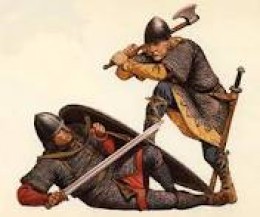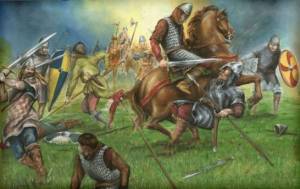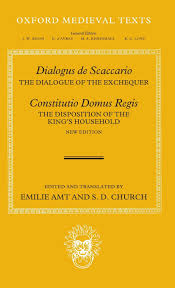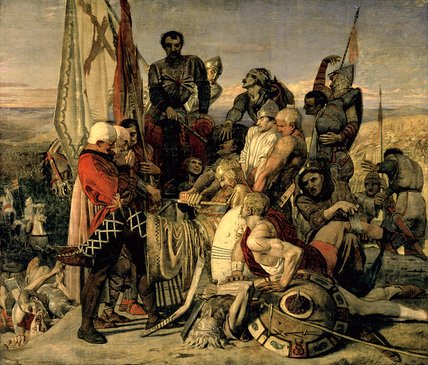‘They plunder, they slaughter, and they steal: this they falsely name Empire, and where they make a wasteland, they call it peace.’ – Tacitus quoting the first-century Caledonian chieftain Calgacus
After the Norman conquest of England in 1066, the English resisted and rebelled for some years, although ultimately in vain. There was the rebellion of the Northern earls and the resistance of Hereward the Wake and Eadric the Wild, to name just three. The response of the conquerors was brutal and involved regional ethnic genocide, such as was meted out during the misnamed Harrying of the North. Ultimately the Norman French kept control of England as the Romans had done in Britain and elsewhere. Tacitus, the first-century Roman senator and historian, quoted the British chieftain Calgacus: ‘They plunder, they slaughter, and they steal: this they falsely name Empire, and where they make a wasteland, they call it peace.’

Eadric ‘the Wild’ overcomes one of the defenders of William fitzOsbern’s wooden castle at Hereford
Both before and after all this mass resistance was finally crushed, individual Englishmen, or small groups of them, would ‘surreptitiously slaughter’ the Norman French ‘the moment their backs were turned’.[1] In the years following the Conquest, as the French expropriation of English lands intensified, large numbers of English thegns fled overseas, many eventually finding their way to the Byzantine empire where they were soon to become the main element in the Varangian Guard.[2] Other thegns plus the vast majority of common English people did not have this option, they had to stay in England. Some took to the woods. The Anglo-Norman monk Orderic Vitalis tells us that the Normans called these ‘resistance fighters’ silvatici – the men of the woods. The English, it is said, called them the same thing in their own language: green men. A tradition of resistance and rebellion against unwanted masters that lies at the heart of the later Robin Hood (‘Robin du Bois’) legend
The French conquerors had to take great care to avoid being attacked by a resentful English population. Wherever they went it had to be accompanied by armed guards. English-born men who collaborated with the invaders had to watch out too. One such was Aethelhelm, the abbot of Abingdon from 1071 to 1084. He had been a monk in the Norman monastery of Jumièges and seemed to have come to despise his own people. While abbot at Abingdon he prohibited the celebration of the feast days of the English saint Aethelwold and the ‘unofficial’ saint Edward the Confessor, referring to them as ‘rustic Englishmen’ (Anglici rustici). The Chronicle of Abingdon Abbey tells us that he:
deemed it necessary never to go about without an armed retinue, for, in the midst of the conspiracies which broke out almost daily against the king, he felt compelled to take measures for his own protection.[3]
To help protect the conquerors, Frenchmen as they called themselves, from being murdered by the English, King William introduced a ‘new law’ known as the ‘murdrum’. Marc Morris writes in The Norman Conquest:
By this law if a Norman was found murdered, the onus was placed on the lord of the murderer to produce him within five days or face a ruinous fine. If the culprit remained at large despite his lord’s financial ruin, the penalty was simply transferred to the local community as a whole, and levied until such time as the murderer was produced… The murdrum fine conjures the vivid picture of Englishmen up and down the country, continuing to vent their anger against their Norman occupiers by picking them off individually whenever the opportunity presented itself.[4]
The circumstances surrounding William’s introduction or reintroduction[5] of the murdrum fine was made clear in the late twelfth century by the Norman Richard fitz Nigel (c.1130 – 1198). Richard was an administrator, writer, and bishop of London. His most famous surviving work is the Dialogue of the Exchequer (Dialogus de Scaccario). [6]
This was composed in the late 1170s… The work takes the form of a dialogue between a master and a student. It is divided into two parts, the first dealing primarily with the staff and structure of the exchequer, the second with the operation of one of its sessions. Also included is a variety of incidental, often historical, material.[7]

The Norman Conquest
In chapter 10 of the Dialogue, titled ‘What murder is, and why so called?’, Fitz Nigel defined murdrum as ‘the secret death of somebody, whose slayer is not known… ‘. It was ‘hidden’ or ‘occult’. He continues:
Now in the primitive state of the kingdom after the Conquest those who were left of the Anglo-Saxon subjects secretly laid ambushes for the suspected and hated race of the Normans, and, here and there, when opportunity offered, killed them secretly in the woods and in remote places: as vengeance for whom when the kings and their ministers had for some years, with exquisite kinds of tortures, raged against the Anglo-Saxons; and they, nevertheless, had not, in consequence of these measures, altogether desisted…
He then described how ‘a plan was hit upon’ whereby when ‘a Norman was found killed’ a large fine would be imposed on the ‘hundred’ in which he was found. He then describes how this operated.
 Importantly this murdrum fine was to be imposed only for the murder of a Norman or other Frenchman; murders of Anglo-Saxons, i.e. English, were excluded. The student then asks the master: ‘Ought not the occult death of the Anglo-Saxon, like that of a Norman, to be reputed murder?’. This was obviously a question many English had and probably still were asking.[8] Fitz Nigel’s answer tells us a lot. He replies that originally the murder fine was not meant to be levied for any murder of an Englishman, adding that ‘during the time that the English and Normans have now dwelt together, and mutually married and given in marriage, the nations have become so intermingled that one can hardly tell today I speak of freemen who is of English and who of Norman race’.
Importantly this murdrum fine was to be imposed only for the murder of a Norman or other Frenchman; murders of Anglo-Saxons, i.e. English, were excluded. The student then asks the master: ‘Ought not the occult death of the Anglo-Saxon, like that of a Norman, to be reputed murder?’. This was obviously a question many English had and probably still were asking.[8] Fitz Nigel’s answer tells us a lot. He replies that originally the murder fine was not meant to be levied for any murder of an Englishman, adding that ‘during the time that the English and Normans have now dwelt together, and mutually married and given in marriage, the nations have become so intermingled that one can hardly tell today I speak of freemen who is of English and who of Norman race’.
He added that this intermingling didn’t of course extend to the majority of English people: ‘the bondsmen who are called villani.’ These villani still being ‘not free, if their lords object, to depart from the condition of their station’. Fitz Nigel was talking here of conditions in England in the late twelfth century when the fine was still being imposed, but by now probably as much as a simple revenue raising device as a blatant tool of a conqueror’s repression, as it had been when introduced.
Answering another question concerning the supposed ‘mercy’ of the Conqueror (i.e. William the Bastard) towards ‘the race of the English’, who were ‘subjugated and suspected by him’, Fitz Nigel answers that he will tell of what he has heard ‘on these matters from the natives themselves’. It is worth quoting this answer in full:
After the conquest of the kingdom, after the just overthrow of the rebels, when the king himself and the king’s nobles went over the new places, a diligent inquiry was made as to who there were who, contending in war against the king had saved themselves through highs. To all of these, and even to the heirs of those who had fallen in battle, all hope of the lands and estates and revenues which they had before possessed was precluded: for it was thought much for them even to enjoy the privilege of being alive under their enemies. But those who, having been called to the war, had not yet come together, or, occupied with family or any kind of necessary affairs had not been present, when, in course of time, by their devoted service they had gained the favour of their lords, they began to have possessions for themselves alone; without hope of hereditary possession, but according to the pleasure of their lords. But as time went on, when, becoming hateful to their masters, they were here and there driven from their possessions, and there was no one to restore what had been taken away, a common complaint of the natives came to the king to the effect that, thus hateful to all and despoiled of their property, they would be compelled to cross to foreign lands. Counsel at length having been taken on these matters, it was decided that what, their merits demanding, a legal pact having been entered into, they had been able to obtain from their masters, should be conceded to them by inviolable right: but that, however, they should claim nothing for themselves by right of heredity from the time of the conquest of the race. And it is manifest with what discreet consideration this provision was made, especially since they would thus be bound to consult their own advantage in every way, and to strive henceforth by devoted service to gain the favour of their lords. So, therefore, whoever, belonging to the conquered race, possesses estates or anything of the kind, he has acquired them not because they seemed to be due to him by reason of heredity, but because his merits alone demanding, or some pact intervening, he has obtained them.
As Fitz Nigel makes abundantly clear (remember these are the words of a French-speaking Norman administrator although supposedly reporting what he had been told by the ‘native’ English), the English could ‘claim nothing for themselves by right of heredity from the time of the conquest of their race’. Anyone ‘belonging to the conquered race’ could only possess ‘estates or anything of the kind’ with the agreement and forbearance of their French lord and never through any ‘heredity right’.

Robin Hood (Robin du Bois)
To repeat somewhat, the murdrum fine did not extend to any Englishman who was murdered. The law was explicitly introduced to help deter the English from murdering their Norman French conquerors and to punish the English community when they did so. If a Norman lord could prove that the person murdered was English he would avoid paying the fine. This became known as the ‘Presentment of Englishry’ and was not abolished until the late fourteenth century.
England has become a residence for foreigners and the property of strangers. At the present time there is no English earl nor bishop nor abbot; foreigners all they prey upon the riches and vitals of England.
William of Malmesbury, 1135.[9]

The Body of Harold Brought Before William the Conqueror, 1844-61 by Brown, Ford Madox at Manchester
Notes and references:
[1] Marc Morris, The Norman Conquest, London, 2012, p. 262.
[2] See: https://thewildpeak.wordpress.com/2013/10/20/exile-rather-than-servitude-the-english-leave-for-constantinople/
[3] John Hudson, ed. Historia Ecclesie Abbendonensis: The History of the Church of Abingdon Volume 1, 2007, Oxford.
[4] Morris, Conquest, p. 262-263.
[5] It has been argued by Bruce. R. O’Brien that this murdrum fine had actually already been introduced by King Knut. See: From Mordor to Murdrum, The Preconquest Origin and Norman Revival of the Murder Fine, Speculum, Vol. 71, No. 2, 1996, pp. 321-357. But as Marc Morris rightly says: ‘Even if this is true, and the law was simply revived by William, it does not diminish its value as evidence for conditions in England after the Norman Conquest’, see: Morris, Conquest, p. 385.
[6] E. Amt & S. D. Church, eds. and trans., Dialogus de Scaccario, and Constitutio Domus Regis: The Dialogue of the Exchequer, and the Disposition of the King’s Household, Oxford, 2007; Online English translation: http://avalon.law.yale.edu/medieval/excheq.asp#b1p10.
[7] John Hudson, ‘Richard fitz Nigel (c.1130–1198)’, Oxford Dictionary of National Biography, Oxford University Press, 2004 [http://www.oxforddnb.com/view/article/9619, accessed 15 May 2014]
[8] This law was not abolished until the fourteenth century.
[9] Quoted in the excellent: Peter Rex, The English Resistance, The underground war against the Normans, 2009, p.7.